Successful localization of photoresist and colorless polyimide material
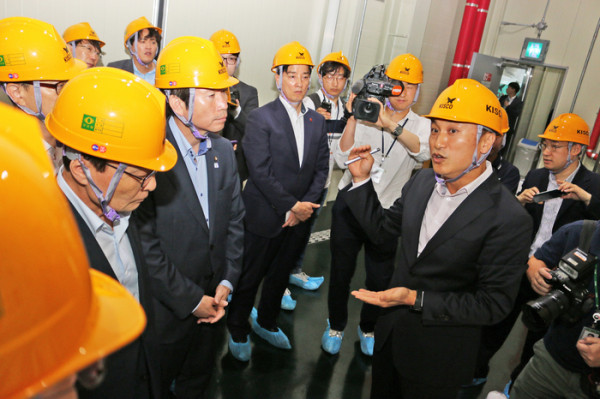
▲ In order to check the semiconductor materials and parts industry, which is suffering from Japan’s export restrictions, the Democratic Party’s Leadership Committee meeting was held at KISCO’s Incheon Plant (Chairman Kim Heung-jun) at 10:00 am on July 26 (Friday). © TIN News
KISCO, a manufacturer of materials related to photoresists, a Japanese export control item, is a professional chemical material company that has been operating for 48 years. KISCO’s main products are textile dyes, digital textile printing inks, organic electronic materials for displays and semiconductors.
Democratic Party leaders, including Lee Hae-chan, Chairman Lee In-young, Chairman of the Joong-sik Policy Committee, received briefings from the vice president of KISCO, Lee Sang-ho.
Representative Lee Hae-chan said, “I heard that I am worried about what to do if I don’t supply materials to Japanese people,” he said. “I think it is an issue that needs to be solved more diplomatically because it is an interdependent relationship.”
“It is a great achievement to realize that companies and governments cannot escape the weakness of the economy without independence of the material and parts industry by themselves,” he said. “We must overcome the process that we have relied on in Japan for parts and materials. I think the steps have come. ”
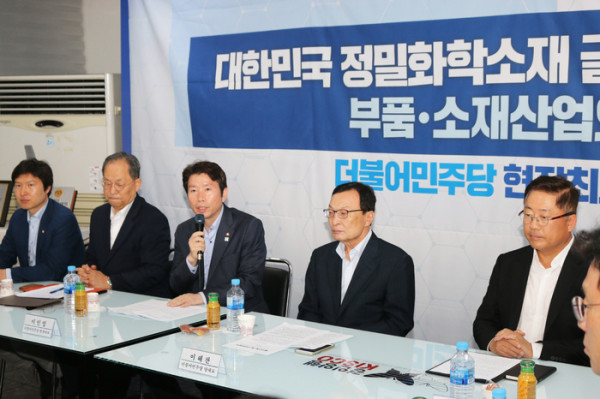
▲ Lee In-young, President of the Democratic Party’s Leadership Committee, at a meeting held at KISCO. © TIN News
Lee In-young also expressed his gratitude that “we are proud that we have a very important technology to supply Japanese photoresist companies with major materials directly by KISCO.”
Sang-Ho Lee, Vice President of Kyung-In Yang said, “We have succeeded in localizing photoresist, an important raw material of photoresist, and supply one third of the global market.”
In the meantime, Korean companies have been largely alienated from the basic raw material supply ecosystem in the global fine chemicals field due to their technological leadership strategies centered on Europe and Japan and their weak position in China due to low price of fuel.
However, as the Chinese government has taken measures to forcibly close many chemical corporations due to safety accidents such as large-scale explosions in China and environmental and pollution problems, major global chemical companies and fine chemicals companies have recognized the seriousness of supply stability.
At the same time, demand for global electronic materials companies is shifting to Korean companies with good quality, stable supply and price competitiveness, and new opportunities are being opened for Korean fine chemical companies.
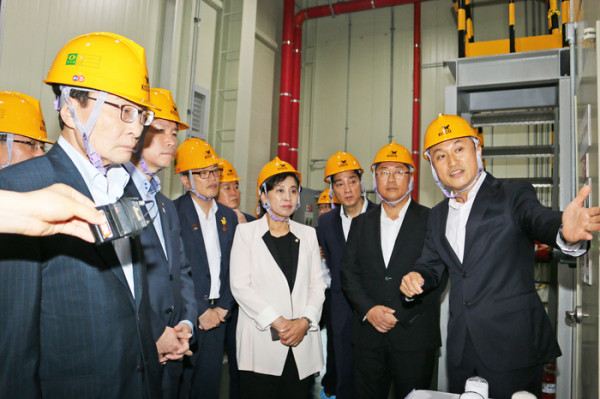
▲ Democratic Party leaders are being briefed by Lee Sang-ho, Vice president of KISCO. © TIN News
In particular, KISCO, based on 50 years of organic synthesis technology, has developed a solution to Japanese export regulations, producing materials that are the key raw materials for photoresists and colorless polyimides, which are recently designated as export control items in Japan. KISCO has already localized the raw materials and has been supplying to domestic and overseas major customers including in Japan.
For example, in 2005, KISCO established DKC, a joint venture with Daito Chemix of Japan, and localized one of the photoresist’s most important raw materials, supplying about one third of the global market. It is expected to contribute to the localization of materials that depended on foreign countries by successfully developing and producing core monomers of polyimide using its own process technology.
In particular, in order to respond to the increasing demand for electronic materials, KISCO has continuously invested in production facilities in Korea and hired and nurtured development and production experts who can operate them.
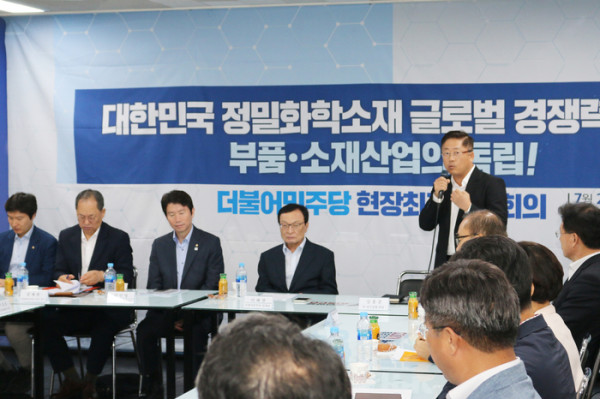
▲ Kim Heung-joon, chairman of KISCO, said, “It is easy for the first-ranked company to maintain the first place, but the second place is more difficult than the first, so the government should be interested not only in the first but also in the second.” © TIN News
Kim Heung-joon, Chairman of the company, said, “In order to expand the number of new manufacturing plants in accordance with global environmental and safety standards, we have secured a total of 125,000 square meters of land in the third industrial complex in Iksan City, “We are experiencing difficulties in cost competitiveness and fund management due to the fact that it takes more than twice as much facility investment cost as expected due to enhanced environmental and safety standards.” “It is a matter of course to meet global environmental standards, As a company, it’s impossible to be globally competitive with all the costs alone. ”
In addition, according to the current situation of export regulation in Japan, the establishment of a sound and competitive ecosystem in the core material industry is becoming an important factor in strengthening and maintaining national competitiveness.” We need diversification of sourcing of core materials, “It is easy for the first-place company to maintain the first place, but it is more difficult for the second-place to climb to the top. I would like to be interested not only in the first company but also in the second. ”
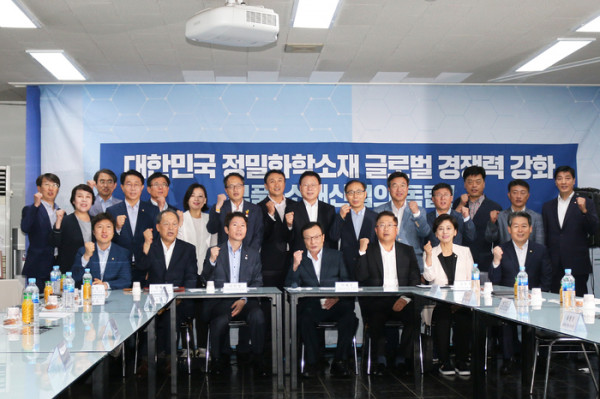
▲ In addition to visiting KISCO, the Democratic Party leadership and members of the chemical industry posed for some commemorative photos. © TIN News
The Democratic Party’s leadership also visited other local companies related to semiconductor material parts and equipment including Dongjin Semicon, a semiconductor company in Hwaseong, Gyeonggi Province on the 12th. On the 19th, they visited the Korea Institute of Science and Technology (KIST).
The Democratic Party promised active support at the government level, including setting up related laws for the independence of material parts equipments, planning R&D and budgeting for facility investment.
At the end of the day, Kim Jung-hwan, head of the Planning and Coordination Department of the Ministry of Industry, Kang Jeong-yoon, Director of Industrial Technology Evaluation and Management, Yoon Bong-sik, executive director of the Korea Dyestuff Industry Cooperative, and representatives of Nacha-su Leaderstec, also reviewed related organizations and corporate officials to ease the burden on Korean companies in the Corolla Act and the Peace Act. Increased investment costs due to regulations, maintenance of sunset business and diversification of R & D support scope were discussed.
Reporter Kim Sang-hyun tinnews@tinnews.co.kr
View original article▶ http://www.tinnews.co.kr/17157
